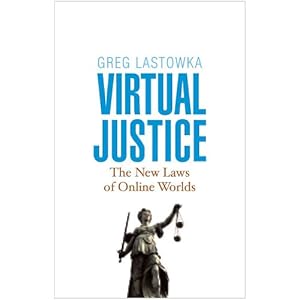I spent the last few days reading Virtual Justice by Greg Lastowka. Lastowka outlined some legal issues that arise in virtual environments.
Who owns what? What rights — if any — do you have when buying or creating digital content?
It is important reading for anyone involved in virtual digital environments. In large environments like World of  Warcraft and Second Life merely participating or building your own business can be a hazardous task.
Reading the Secondlife TOS in it self is a bit of a chore to understand it not easy and for a legal interpretation you need to have a good knowledge of the law. A law that in many cases was not designed with consideration to Virtual environments.
I have spent the last five years or so involved in virtual worlds. When I first entered Second Life the platform appealed to me from a business point of view, many a time have I been told it is only a game it is not real… So I thank Lastowka for this:
My point here is fairly simple: the person who buys a castle in Ultima Online or a plot of land in Second Life is, in all likelihood, not in need of professional psychological help. We should accept that people who are healthy and sane can be passionate participants in virtual worlds.
Good, I feel better now.

After years in Second Life, tossed around by Linden Lab, trying to find a way to build a business that I could safely recommend to my customers, I welcomed the birth of Open Simulator — it could not have been better timed.
I now have the ability to run my own 3D environment, that takes away a lot of potential difficult questions about ownership. The content is now on my own or hosted servers and I can offer my customers the same deal. With easy backup systems ready configured environments like the Diva Distro running your own virtual world is all of a sudden easy.
I agree with Lastowka — the owner of the virtual world looks to have almost god like powers with Terms of Service agreements that if you read them would scare most people.
That same problems still exist if you are not the owner but renting space in an online world as is the case in WoW or Second Life — or does it?
As I see it, that need not be the case if you as a provider of the space at least include backups as part of the service to your customers. The backups then enables the owner to start somewhere else if that need to happen (backups however can also create problems in the case of non copy items) and would naturally only work on the same platform.
With the advent of hypergrid (the ability to freely move between virtual worlds) it is likely that we will see lots of smaller 3D environments with avatars browsing virtual worlds similar to the way we now browse the World Wide Web. This will put up more challenges for justice in virtual worlds and will most certainly ensure that some of the Wild West mentality that exists will live on
Questions forming around copyrights are difficult. For example a large, complex 3D building is made up of many components and will no doubt include items that are not all created by the designer of the final build, this is not much different from what happens in day to day life.
A digital item is however a lot easier to copy than for example a car, fridge, TV or leather couch in “the real world.â€
A well-developed marketplace for digital items — anything from textures to final builds — plus an easy to understand permission system and sensible pricing, could help.
Licensing under Creative Commons might also help to achieve virtual justice and pave the road for new laws for online worlds.
I recommend:  To buy the book  or get a free PDF download please go here.
(This article adapted with permission from Troppo Design.)
- Virtual Justice in virtual worlds - November 9, 2010
